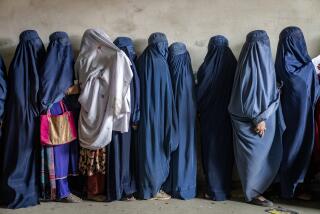Afghans Decry Violence Against Women
- Share via
KABUL, Afghanistan — More than 300 women took to the streets of Kabul on Thursday to protest growing violence against them and demand that the Karzai government take action against those responsible for the recent deaths of five women.
“Why is the government so quiet about the death of our sisters in the last two weeks? Women are dying on the streets of Afghanistan these days and no one is saying a word,” said Jamila Afghani, an activist who organized the demonstration.
On Monday, the bodies of three women were found in Baghlan province, about 75 miles north of Kabul.
Provincial officials said the women had been raped, strangled and dumped on a road, with letters condemning them for working for international nongovernmental organizations.
On April 28, Afghan military forces fatally shot a woman during a brawl that erupted at a parade in the western city of Herat.
And a woman in the northern province of Badakhshan was publicly slain by her family and local mullahs April 20 after being accused of adultery.
“This is not justice. Afghan men are once again taking the law into their own hands and making life-and-death decisions for women,” said Suraya Parlika, head of the All Afghan Women’s Union, an independent lobby for women’s issues.
Before it was ousted by a U.S.-led invasion in late 2001, the ultraconservative Taliban regime was known for publicly stoning women for alleged crimes that were not proved in court.
“Kabul is somewhat different. We have some freedoms, but in the provinces, Afghan women live as they did under the Taliban. They are prisoners of this repressive culture,” said one demonstrator as she stood behind a large white banner denouncing government inaction.
Women from more than 26 organizations, including human rights groups and political parties, participated in the protest. Afraid of being singled out, many of them huddled in tight groups, tugging on their scarves and shirttails.
“We want the government to implement the laws and rights given to us. So far everything has been on paper. I haven’t heard President Karzai or any other government official truly stand up for us,” said Farah, a demonstrator clad in a burka who did not want to give her full name.
Hours after the protest, President Hamid Karzai’s office said it had not heard about the event. However, in recent days the government has launched investigations into the deaths of the three women in Baghlan and the 22-year-old woman named Amina who was killed in Badakhshan.
Amina was beaten to death by her family after a local council led by the village mullah accused her of adultery.
“Twelve people are in police custody, including Mullah Yusouf, who is actually an armed local commander in the area. He is the one who issued the fatwa to kill Amina,” said Ahmad Nader Nadery, a spokesman for the Afghan Independent Human Rights Commission.
The commission said a local commander and three area religious leaders declared Amina guilty without a proper trial and sentenced her to death.
Although the constitution of Afghanistan, signed in late 2003, gives women equal rights, including the right to vote and to a fair trial, most of the country operates on customary laws based on traditions and interpretations of Islam.
Warlords still control large swaths of the country, and the family court system is practically nonexistent. The problem is compounded by a tradition of families taking matters into their own hands out of fear of public embarrassment.
“There needs to be a proper system to record marriages and divorces in Afghanistan, where women have proof of such events. Then they can protect themselves,” said Orzala Ashraf, director of a nongovernmental group called Humanitarian Assistance for Women and Children of Afghanistan.
The majority of crimes against women still go unreported, and many women say that there must be a shift in cultural attitudes.
“The government must enforce laws that protect women,” said Rahina Saboor of the private Center for Afghan Women’s Health Development. “The fear of a working justice system will start to change behaviors and eventually change the anti-woman culture that has developed in Afghanistan in the last 25 years of war.”
More to Read
Sign up for Essential California
The most important California stories and recommendations in your inbox every morning.
You may occasionally receive promotional content from the Los Angeles Times.













